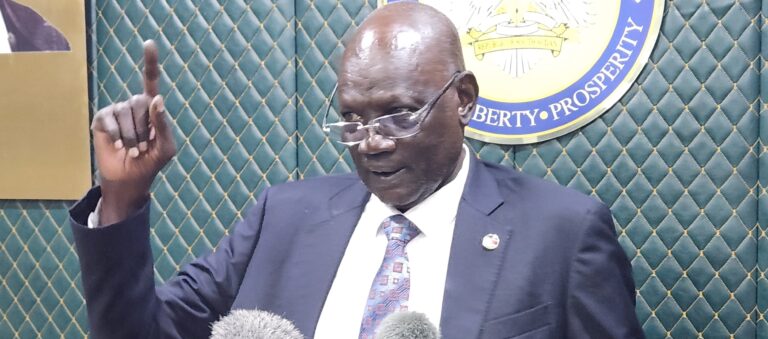South Sudan’s Minister of Information Michael Makuei Lueth revealed on Wednesday that his ministry has played a key role in helping the South Sudan Revenue Authority (SSRA) generate 47 billion South Sudanese pounds per month, primarily through taxes and charges levied on institutions under its jurisdiction, including telecommunication companies.
Speaking at the 8th Governors’ Forum in Juba, Makuei credited the SSRA’s digitalized payment system for enabling these significant collections.
“With the help of the telecom sector and the digitalization of the Revenue Authority, the government of South Sudan is now collecting at least 47 billion South Sudanese pounds each month,” Makuei said.
The information minister emphasized that his ministry monitors the amounts collected and identifies the institutions involved, acknowledging that the revenue is generated through the efforts of his team.
“This revenue is being collected through the efforts of the ministry,” he added. “We track the figures and monitor the institutions responsible.”
However, Makuei clarified that his ministry does not retain the collected funds but merely keeps records of the collections.
“To be clear, all the money collected does not belong to us,” he explained. “It is collected by the Revenue Authority. The National Revenue Authority is the entity responsible for handling these resources.”
“We are simply custodians of the figures,” Makuei continued. “Our role is to track the revenue being collected and monitor the institutions involved. The actual collection and receipt of funds are managed entirely by the NRA.”
In addition to discussing revenue collection, the minister highlighted other achievements of his ministry.
“Although I was originally supposed to present on the Tumaini Peace Initiative, I decided to focus on the Ministry of Information, Communication, and Postal Services, as I am no longer directly involved with Tumaini,” he explained.
First Vice President Riek Machar, who chairs the Governors’ Forum, thanked Minister Makuei for his presentation, saying, “Thank you, Hon. Michael, for this report. We have now learned that your ministry is generating substantial revenue.”
The landlocked oil-rich country depends on oil revenue to finance 98 per cent of the budget, but production has reduced due to the war in Sudan between the army and the paramilitary Rapid Support Forces (RSF).
South Sudan’s oil pipeline to international markets, which passes through neighbouring Sudan, was damaged in February, prompting the Dar Petroleum Oil Company to suspend loadings.
Civil servants and soldiers have gone unpaid salaries for nearly a year. Professionals with monthly salaries ranging from $10 to $50, such as teachers and doctors, have also experienced protracted payment delays.




